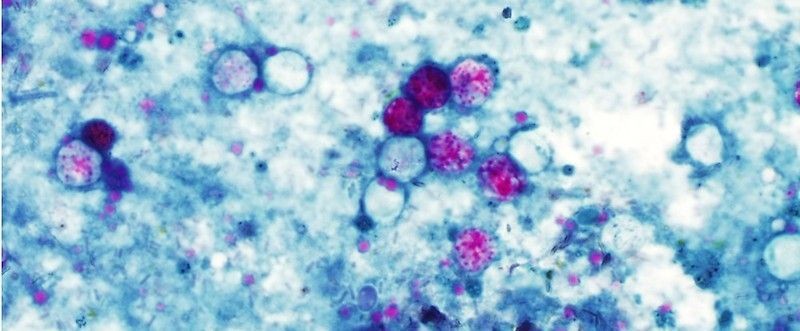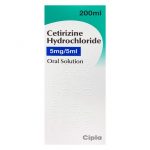
Contents
- 1 Cyclospora Infection (Cyclosporiasis)
- 1.0.1 What causes a Cyclospora infection?
- 1.0.2 Is Cyclospora contagious?
- 1.0.3 What are the symptoms of a Cyclospora infection?
- 1.0.4 Diagnosis of a Cyclospora infection
- 1.0.5 What is the treatment for a Cyclospora infection?
- 1.0.6 What are complications of a Cyclospora infection?
- 1.0.7 What is the prognosis of a Cyclospora infection?
- 1.0.8 Is it possible to prevent a Cyclospora infection?
Cyclospora Infection (Cyclosporiasis)
Cyclosporiasis is a diarrheal illness caused by the Cyclospora cayetanensis parasite, which is ingested accidentally when consuming contaminated uncooked food or water.
What causes a Cyclospora infection?
Cyclospora cayetanensis is a parasite that cycles between the environment (soil) and humans. It survives as an oocyst and can resist extreme temperatures and normal levels of chlorine in treated water. When temperatures rise, the oocyst matures and releases infectious sporocysts. Ingesting these sporocysts allows them to invade the small intestine’s epithelial cells, multiply, and produce new oocysts. The cycle repeats when these oocysts are excreted in feces.
This infection is most common in tropical and subtropical climates, but outbreaks in cooler areas are often due to imported food exposed to contaminated soil or water. Fresh produce like lettuce, raspberries, basil, and snow peas have been associated with past outbreaks. The CDC has reported outbreaks in various states, such as Texas, Iowa, and Nebraska. Bagged lettuce and salads from certain brands were recalled due to contamination. Traveling to tropical or subtropical countries is a risk factor, although the risk is relatively low.
Is Cyclospora contagious?
Cyclospora is not spread directly from person to person. The oocysts in stool take time to mature in the environment and become infectious, so the infection occurs through fecal-oral transmission. The incubation period is two to 14 days.
What are the symptoms of a Cyclospora infection?
The main symptom of cyclosporiasis is watery diarrhea lasting for more than a week. Other common symptoms include abdominal cramping, fatigue, increased gas, decreased appetite, weight loss, heartburn, and nausea. Some individuals may experience flu-like symptoms with a low-grade fever and muscle aches. The severity of symptoms is higher in people with weakened immune systems.
Diagnosis of a Cyclospora infection
Most cases are diagnosed by primary care providers initially, but if diarrhea persists, referrals may be made to gastroenterologists or infectious disease doctors. Stool samples are collected over a period of time to increase the chances of detecting Cyclospora oocysts.
What is the treatment for a Cyclospora infection?
Mild or asymptomatic cases usually resolve on their own without treatment. Oral trimethoprim-sulfamethoxazole (TMP-SMX) is the preferred treatment for symptomatic cases. Anti-diarrheal medication may be recommended, but only with a doctor’s approval. Nitazoxanide or ciprofloxacin may be used as alternative therapies in specific cases. Pregnant women should consult with their obstetricians before taking any medication.
What are complications of a Cyclospora infection?
Dehydration can occur due to profuse diarrhea. It is important to stay hydrated by consuming fluids and electrolytes. Fatigue may persist after the diarrhea subsides.
What is the prognosis of a Cyclospora infection?
Complete recovery is expected, and antibiotics can speed up the recovery process for symptomatic individuals. HIV-infected patients may experience relapses and should be referred to infectious disease specialists.
Is it possible to prevent a Cyclospora infection?
Practicing general food safety measures, especially when traveling in areas with uncertain sanitation, can help prevent infections. Washing hands or using alcohol-based sanitizers before eating is essential. Avoiding raw fruits and vegetables or washing and peeling them with disinfected or bottled water is recommended for travelers. Bottled or canned fizzy drinks are safe, but water filters must be effective against cysts or particles. Pre-packaged raw vegetables and fruits should be rinsed thoroughly. Currently, there is no available vaccine for Cyclospora cayetanensis infection.
By clicking Submit, I agree to the MedicineNet’s Terms & Conditions & Privacy Policy and understand that I may opt out of MedicineNet’s subscriptions at any time.
Shoff, W. "Cyclospora Infection (Cyclosporiasis) Medication." Medscape. Aug. 8, 2017. .
United States. Centers for Disease Control and Prevention. "Food and Water Safety." Feb. 20, 2020. .
United States. Centers for Disease Control and Prevention. "Parasites — Cyclosporiasis (Cyclospora Infection)." Mar. 12, 2020. .
Wright, S.G. "Protozoan Infections of the Gastrointestinal Tract." Infectious Diseases of North America 26 (2012): 323-339.


